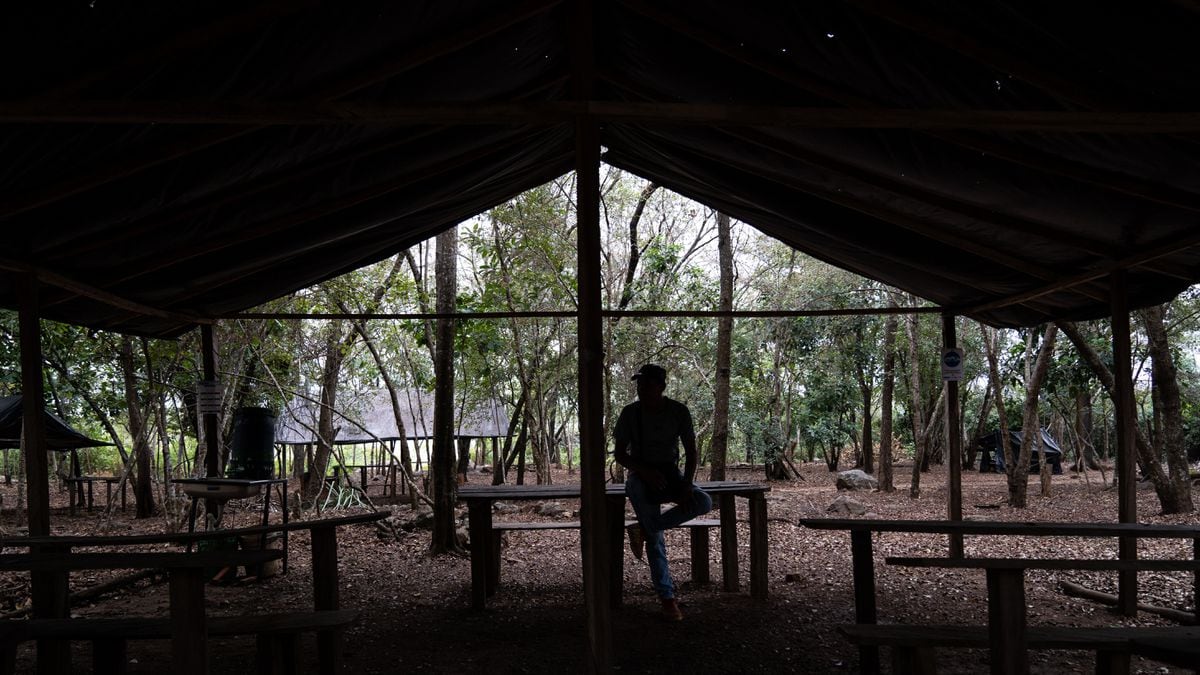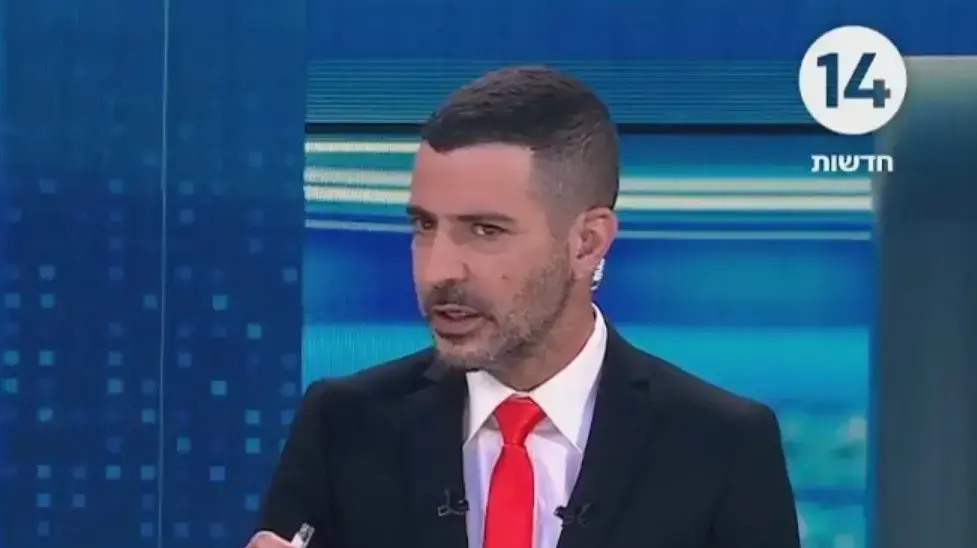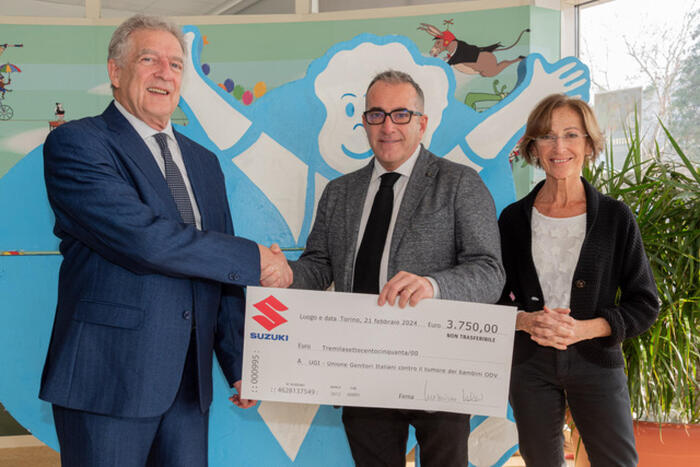Félix Arango does not keep photos from when he was a child.
At the age of ten he was forced to run away from home because his stepfather beat him with clubs, and his mother encouraged him to hit him harder.
He worked in the field from sunrise to sunset, plowing the land with his hands.
He grew up alone, without stepping foot in a school classroom.
At 38, still illiterate, he joined the FARC guerrilla.
He laid down his arms in 2017 after the peace agreement with the Government.
In the transition to civilian life, Félix has learned to read and write at the age of 64, and now he is a tour guide in Tierra Grata, a rural citadel in northern Colombia where he lives with other ex-combatants and the families of he.
From the land of his future house, he can see the mountain ranges that he used to patrol and hide from.
Felix shows part of his cartridge belts.
Chelo Camacho
For a common guerrilla like him, there were no schedules or plans for the future.
On long walks through jungles and mountains, he was often the last in line, with the mission of erasing the footsteps of the walkers.
Sometimes he carried up to 50 kilos in marches that lasted days and nights.
A weight, that of being a guerrilla, that he carries so much that he still presents himself with his nom de guerre.
He clarifies that he is officially registered as Alcides Rivera and shrugs when he remembers his childhood in Catatumbo: “I had a hard life.
When I joined the guerrilla, nothing great was left for me because I was already taught to suffer”.
***
Tierra Grata, located in the department of Cesar, can only be reached by camper-style car or motorcycle.
At the entrance, soldiers camouflaged among the bushes huddled together.
From the winding and dusty road, you can see the Serranía del Perijá and the foothills of the Sierra Nevada de Santa Marta, with the highest mountain peaks in Colombia.
In November 2016, after the final signing of the peace agreement between the Government and the FARC, 23 temporary village zones were established for the concentration and laying down of weapons of 13,000 ex-combatants, with UN supervision.
Tierra Grata is in La Paz, Cesar, where 69% of the population has been a victim of the armed conflict (18,179 victims).
Ex-combatants make the bricks with which they build their houses. Chelo Camacho
Felix arrived in the area carrying a rifle and a backpack.
He exchanged them for several tourism courses to be a local guide for the Ecotours company, made up of ex-combatants.
Félix receives visitors and gives them tours on the sidewalk and hiking to the river in Manaure, the neighboring town.
The area is conducive to bird watching: María Mulata, manacon, condor, toucans, peacocks, hummingbirds... Flocks of macaws fly over the path.
Colombia is the country with the greatest diversity of birds, with 1,954 species, which is equivalent to 20% of the total that exist in the world.
More than 300 people live in Tierra Grata.
Among them are 121 of the 162 men and women who rejoined civilian life there;
38 have left for other towns and two have died from traffic accidents.
Only one returned to the war and today is part of the Segunda Marquetalia, a dissident group led by Iván Márquez.
From there, Seuxis Pausias Hernández, alias 'Jesús Santrich', one of the main FARC negotiators in the Havana talks, disappeared.
He declared himself in absentia because of a US extradition request for drug trafficking, a situation that the Truth Commission described as a trap against peace.
He returned to arms in the Second Marquetalia and, in May 2021,
Felix, on the other hand, continues to cling to civilian life.
He sleeps in a windowless room twenty feet long by four wide, like the other ex-combatants.
He has a simple bed and clothes hanging on wire ropes.
He has not lost the habit of washing by hand, as he did for more than twenty years in the guerrilla.
Today he dreams of building his house.
Through loans, the ex-combatants bought 24 hectares of land to make 150 houses in a self-construction project.
In black works each house costs 35 million pesos (about 7,400 dollars at today's value).
Félix already has his lot, but he has only been able to buy sand and gravel, since he lives only on the monthly income he receives from the Government (90% of the minimum wage).
The project began in May 2022. The designs of the houses are all similar: fiber cement roof tiles and concrete block walls.
The ex-guerrillas buy the materials for the houses in the same village.
Master builders and ex-combatants work daily in construction.
While sharpening a shovel, Fredys Tobías Pinto says that he is excited about having his own house.
He spent 35 of his 63 years in the guerrilla.
He is now part of a demining organization that was born with the agreement.
“The most difficult part of returning to civilian life is economic stability,” he says.
Tobías, a former combatant who signed the peace. Chelo Camacho
In Tierra Grata 60 babies have been born;
For this reason, the citadel project includes two parks for children and a kindergarten.
Solís Almeida, a former FARC commander who spent 40 years in the jungle, shows what they have built: a hardware store, a restaurant, a store, a nursery, a block factory, two classrooms, a billiards hall, an ornamentation workshop, a carpentry.
Some of these businesses have been managed through international cooperation;
the Government has donated other constructions, such as the field and the health post that also functions as a dental office.
Ex-combatants who were empirical nurses and dentists in the jungle have validated their knowledge in institutions such as the Seine and the Red Cross;
they are now certified as oral health technicians and nursing assistants.
As part of the jobs, works or activities with a reparative content that they assume as part of transitional justice, the ex-combatants of this regroupment zone built a water treatment plant that has benefited neighboring communities.
In these five years, around 80 ex-combatants have graduated from basic education.
Solís Almeida, 60, validated his high school studies in Tierra Grata and is now studying Public Administration in Valledupar, forty minutes away.
As a former commander, she has had to appear before the Special Jurisdiction for Peace and the Missing Persons Search Unit.
Former FARC combatants build houses and seek a new life in constant fear of being killed. Chelo Camacho
When it was learned in 2016 that Tierra Grata would be one of the areas where ex-combatants would regroup, the inhabitants of the closest township, San José de Oriente, were reluctant.
They feared the return of violence.
Today they have held meetings with victims from the community and visited the town to hold health days.
Carolina Vargas Cabrera is 42 years old and is the departmental advisor for women, gender and diversity of Comunes, the political party that was born after the signing of the agreement.
Along with 32 women, she wants to build a startup store to sell backpacks, hammocks, clothing and jewelry mended by them.
A beauty salon is also among her plans.
To achieve this, they hold raffles and sell food, but she says that it has been difficult to get support.
“I am concerned about the lack of employment for women.
Here there are already many who have studies and courses, and one of the things they require is experience, but they don't give us the opportunity, ”she says.
The stigmatization towards ex-combatants has extended to children.
“At the school where they study, our children are called 'the little guerrillas'”, she laments.
The peace signatories have been in transition to civilian life for a little more than five years, but the greatest fear continues to be that they will be exterminated.
Since the signing of the agreement, according to the UN, 355 ex-combatants have been killed.
Although no homicides have occurred in Tierra Grata, they feel fearful and unprotected by the State.
Flag and uniforms of the FARC-EP in the memory house of the ETCR of Tierra Grata. Chelo Camacho
Meanwhile, they fight to make the citadel grow.
They have created a memory house with book shelves and a replica camp to explain their nomadic life during 60 years of war.
Félix tells how they made cambuches and took shelter from the rain in the jungle.
He walks on the dry leaves and reflects: “I dream of having a good life.
I still have ground to walk on."
Subscribe here
to the EL PAÍS newsletter on Colombia and receive all the latest information on the country.












/cloudfront-eu-central-1.images.arcpublishing.com/prisa/KMEYMJKESBAZBE4MRBAM4TGHIQ.jpg)


